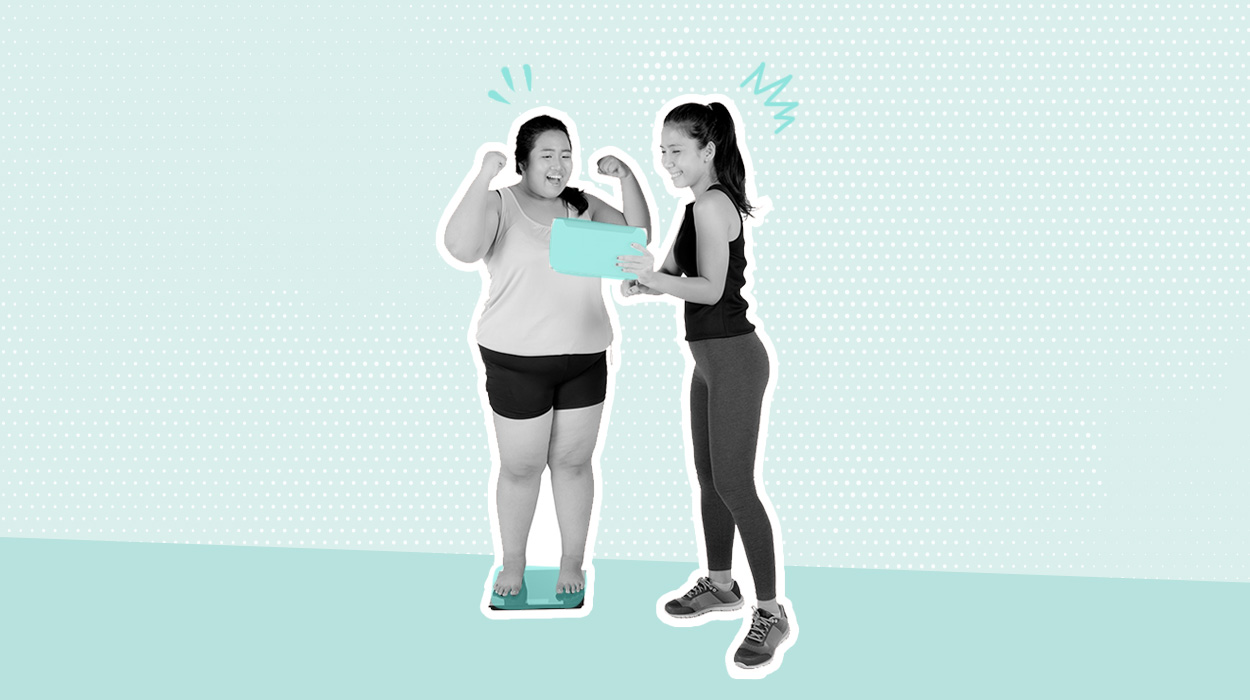Figuring out how to get motivated to lose weight can be hard enough as is, but in a world inundated with quick fixes and fad diets, it can feel even more overwhelming trying to decipher what and who to listen to.
Successful weight loss relies on various lifestyle factors, and long-term weight maintenance can be achieved with the proper knowledge and actions. While it can be helpful for some individuals to know how to calculate net carbs, it may not be necessary or relevant for others.
Achieving weight loss can be attributed to more than just what you eat and often a combination of factors. Understanding key factors can help reduce the pain of trying to muster up the motivation to lose weight.
This article will cover the critical elements of motivating yourself to lose weight. Read on to take control of your health once and for all.
How To Motivate Yourself To Lose Weight
There are five ways you can motivate yourself to lose weight.
- Establish your genuine ‘why’; the underlying reasons for weight loss.
- Tap into your desired identity; an identity shift may be required to embrace new lifestyle changes.
- Find a physical activity or exercise that you genuinely enjoy doing.
- Seek a support network and surround yourself with like-minded people.
- Ditch the short-term ‘quick fixes’ or fad diets; instead, focus on.
How To Get Motivated To Lose Weight
If you have tried to lose weight in the past, you will know that motivation comes and goes. As it fluctuates often, it may become more challenging to maintain your efforts on your weight loss journey.
We know that our motivation levels can have a significant influence on our overall weight loss success, but how do you get motivated to lose weight?
Rather than solely relying on motivation alone, consider factoring in these five proven methods below to develop a strong foundation that can help you achieve long-term success, even when life throws hurdles your way.
Tap Into Your ‘Why’
Right now, you may be asking yourself, how do I get motivated to lose weight?
Understanding your deep, underlying reasons for why you want to lose weight can be a powerful driving force.
While we know that motivation[1] is not always consistent, it is ultimately the driving force that initiates behavior to achieve a goal or outcome.
Taking the time to establish your genuine, internal desires to lose weight and further achieve your desired outcome in whatever form that looks like can be a significant step in overall success.
Establishing your ‘why’ as a means of utilizing intrinsic motivation and strengthening feelings of why you want to achieve your weight loss goals has proved more effective[2] than relying on external factors alone.
Tap Into Your Desired Identity
Successful behavior change is a challenging task. Unlearning and forming new habits that have been present for years can not just occur overnight.
To shift your behavior, you need to shift your identity. Often, when people try to embark on a new weight loss journey, it can start well. But when the process becomes less enjoyable, your results usually slow down, and it can be hard to maintain motivation and stay committed.
When plateaus hit, or the new behaviors you are trying to form clash with elements of your lifestyle built on your previous habits, it can be hard to remain on track if you have yet to establish your internal reasons for your desired change.
Research[2] supports that individuals who embraced a change in their identity experienced success in their weight loss endeavors. Instead of merely framing their efforts as “dieting,” they adopted a new identity associated with a lifestyle shift.
Embracing your new habits as part of your lifestyle can be a practical step towards your weight loss goals.
In addition, ensuring that the desired habits conveniently fit into your lifestyle has shown[2] to be successful in reaching weight loss results.
Find Activities You Enjoy

Exercise[3] is crucial for our health and well-being, but regular physical activity will also help support weight loss efforts.
Getting motivated to lose weight and exercise may seem challenging, but finding activities you enjoy can make your weight loss journey more enjoyable and influence your likelihood of sticking to the newfound activities in the long run.
Exercise doesn’t have to be viewed as a chore or forced to engage in a particular activity because you think it is the best option or method for weight loss.
There are endless options and modes of physical activity and exercise, so finding something you genuinely enjoy can make all the difference in your consistency, enjoyment, satisfaction, and, of course, your weight loss journey.
Greater consistency in exercise or physical activity will help support a healthy weight. If you struggle with motivation, a personal trainer could be a valuable investment to keep you accountable.
Personal trainers can also help set positive expectations, establish a weight loss plan, and guide you with your calorie intake and eating habits.
Seek A Support Network And Surround Yourself With Like-Minded People
A solid support network can be a great motivator and help you stay committed when trying to change certain habits that have been part of your life for a long time.
Surrounding yourself with like-minded people who share the same interests, outlook or mindset as you can also help make desired changes easier. It can be incredibly challenging to change certain behaviors when the people around you don’t share the same views or beliefs as you.
Look to rely on a good friend who may also be on the same path as you, or consider joining a social fitness group such as a running or walking club or a group fitness class.
Being part of a social support network can be an excellent way to feel part of a community and help minimize feelings of loneliness when trying to make positive changes.
Ditch The Short Term Quick Fixes Or Fad Diets
Extreme, fad, or other weight-loss trends are always present and constantly emerging.
While their promise of rapid results can seem enticing, research[4] shows that diets are most helpful when they result in long-term weight loss. Although some methods can result in weight loss momentarily, studies suggest that most successful individuals regain weight after one year.
So, rather than signing up for another short-term solution, establishing positive lifestyle habits ( including healthy eating and regular physical activity) can better support sustainable weight loss and long-term weight maintenance.
Healthy eating patterns that best support weight loss[5] and good health should incorporate adequate intake of fruit and vegetables, healthy fats (monounsaturated and polyunsaturated), lean proteins, and whole grains.
There is a lot of hype around macronutrients, such as carbohydrates, which may make you wonder how many carbs you should be eating daily. Studies have shown that exact macronutrient distribution[6] isn’t as crucial for weight loss as most people believe.
Instead, focus on drinking enough water, including plenty of fruits and vegetables regularly in your diet, substituting unhealthy fats for healthy fats such as flaxseed, and working out how many calories you require for your weight loss goals. These habits will be a valuable approach to weight loss instead of trying to follow a fad diet which will ultimately lead you back to where you started.
While supplements can serve a purpose in your weight loss journey, they should be considered once all other dietary factors are dialed in.
Build Incidental Physical Activity Into Your Day

Incidental physical activity[7] includes daily tasks not typically referred to as structured physical activity but those whereby you are still physically active.
Activities like doing things around the house, gardening, walking to work, and even taking the stairs instead of an elevator all count as incidental physical activity.
You could set a target to increase your daily steps to lose weight or contribute to your weight loss goals. All physical activity will burn calories, and burning more calories than you consume will create a calorie deficit or a negative energy balance.
Creating a negative energy balance[8] through diet, physical activity, or a combination of both is an important underlying mechanism for effective weight loss.
You could start increasing your incidental physical activity throughout your day by:
- Choosing active modes of transport for your commute, like walking, riding a bike, or even parking your car further away to include a walk as part of the distance.
- Set reminders on your phone to stand up from your desk and take a short walk or do some stretches.
- Walk around while taking phone calls rather than remaining seated.
Incorporating these subtle daily activities into your daily routine will help you achieve your weight loss goals and maintain a healthier lifestyle overall.
Why Is It So Hard To Stay Motivated To Lose Weight?
Staying motivated to lose weight has proven hard for many reasons. As we know, motivation is only sometimes consistent and will often fluctuate due to many factors.
Motivation can further be categorized into intrinsic and extrinsic motivation. Extrinsic motivation, or also referred to as external motivation, is typically driven by external factors such as rewards or praise by others.
External factors such as time constraints due to work or family commitments, a lack of appropriate space and equipment to work out in, or limited gym access can create additional challenges to overcome and interfere with motivation levels.
If you still need to fully establish the intrinsic or internal motivators for your weight loss goals, external factors could pose even more of a challenge to maintaining motivation. During tough times, it can become even more demanding to stay committed to your weight loss efforts.
Therefore, motivation alone could be an overrated element. To successfully achieve your weight loss goals and maintain results long-term, taking time to establish healthy habits in your lifestyle will be far more effective.
Conclusion
Weight loss can seem daunting in a world filled with quick fixes and fad diets. While these methods may look appealing due to their promise of rapid results, they are not conducive to sustainable long-term change, nor do they provide health benefits.
The key to achieving lasting success in weight loss differs from what may seem appealing or trending with the latest fad diet.
Taking the time to establish positive lifestyle habits, including healthy eating patterns rich in fruits, vegetables, healthy fats, lean proteins, and whole grains, will help to support a healthy body weight and provide many health benefits.
Incorporating incidental physical activity into your daily routine and finding activities that you enjoy can further boost your overall activity levels, contributing to a negative energy balance that can support your weight loss goal and positively contribute to overall health.
Lastly, the constantly fluctuating nature of motivation can be one of many methods relied upon in your weight loss journey.
While establishing your intrinsic motivation can undoubtedly help you stay motivated, it’s important to remember that setting healthy lifestyle changes that you can maintain will be more reliable for your long-term success.
Frequently Asked Questions
Depression is multifaceted and can increase the difficulty of even the most minor everyday tasks. During these times, it’s important to remember the deep, internal reasons for wanting to lose weight and seek the appropriate support networks to help you.
Weight loss won’t inherently change your personality, but as a result, it may change factors that influence how you present yourself, such as confidence and mood. It could also influence your habits, which may contribute to elements of your personality.
Losing weight is a combination of many factors. While a prominent proponent of weight loss is attributed to behavioral factors, your mindset and outlook can also play a role—changes to your perspective and a continuous effort to overcome challenges.
Weight loss results vary between individuals. It’s difficult to pinpoint when others will notice your weight loss results. However, if you can achieve weight loss[9] of approximately half a kilo per week, people may notice after a couple of weeks.
While everyone will experience fat loss results in different ways and proportions, generally speaking, fat loss cannot be spot reduced, and weight loss will typically occur gradually throughout the whole body.
 Evidence Based
Evidence Based
